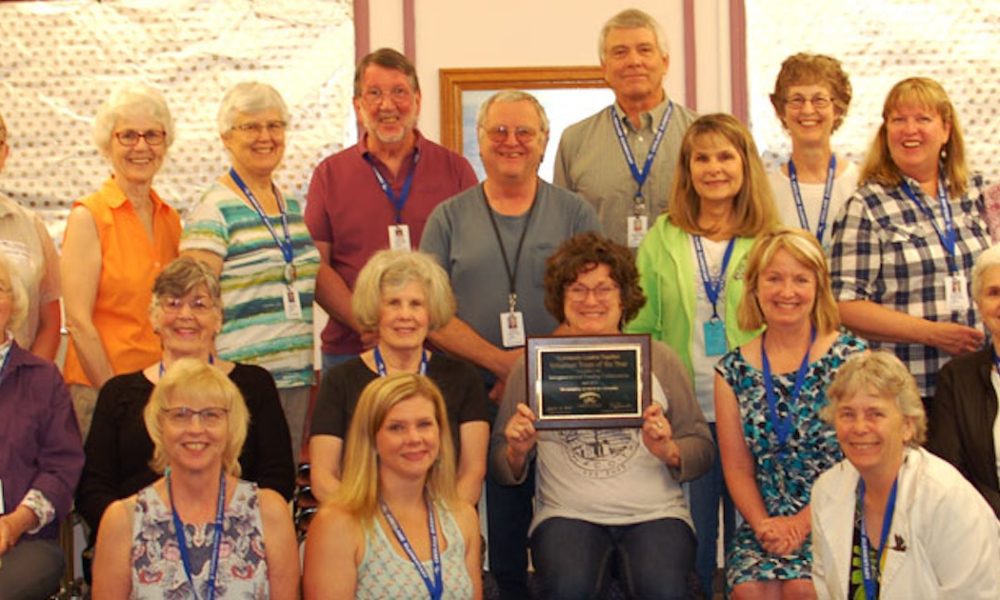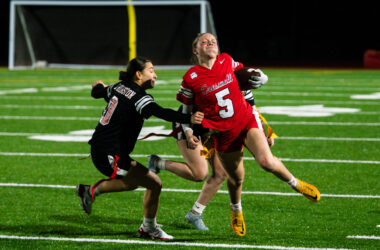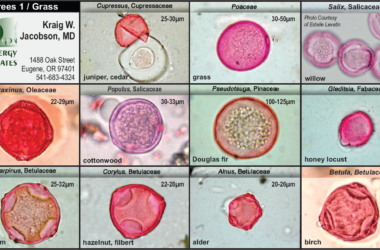 Shown above are 19 of the 30 Creslane IRC team members. In front, from left, are Verna Dey, Juli Meador and Laurie Swanson Gribskov. In the middle, sitting, are Elaine McCoy, Wanda Mae Brooks, Carolyn Hennen, Deb Allison with the United Way Volunteer of the Year plaque, Susan Bennett and Val Moran. In the back, standing, are Sherry Smith, Donna Samson, Verlean McCoy, Ken Parramore, Larry Badten, Eric Cullander, Jo Ann Escujuri, Sue Bowers, Carolyn Beardsley and Mary Keep. ERIN TIERNEY – THE CRESWELL CHRONICLE
Shown above are 19 of the 30 Creslane IRC team members. In front, from left, are Verna Dey, Juli Meador and Laurie Swanson Gribskov. In the middle, sitting, are Elaine McCoy, Wanda Mae Brooks, Carolyn Hennen, Deb Allison with the United Way Volunteer of the Year plaque, Susan Bennett and Val Moran. In the back, standing, are Sherry Smith, Donna Samson, Verlean McCoy, Ken Parramore, Larry Badten, Eric Cullander, Jo Ann Escujuri, Sue Bowers, Carolyn Beardsley and Mary Keep. ERIN TIERNEY – THE CRESWELL CHRONICLE
According to the Center for Public Education (CPE), research strongly indicates that if children cannot read proficiently by the end of third grade, they face discouraging hurdles that can follow them throughout their lives.
Young readers who struggle to academically catch up with their peers are four times more likely to drop out of school, lowering their earning power as adults and possibly costing society in welfare and other forms of support, according to CPE research.
But at Creslane Elementary School, there’s a group of reading warrior volunteers who are dedicated to encouraging and inspiring young readers to lessen their chances of facing those hurdles. Creslane’s Intergenerational Reading Collaboration (IRC) was born of a desire to bring adults and children in grades one through three together, with the shared goal of realizing a child’s strong literacy ability by the fourth grade.
The success of the program recently garnered attention from United Way, as Creslane’s IRC team was was awarded United Way’s Team Volunteer of the Year in April. They received a plaque in recognition, and also received a $500 check which will go toward their $2,000 fundraising goal to buy books for the Summer Reading Program in the Park this summer.
LEARN TO READ, READ TO LEARN
To learn to read, students must be taught to attend to the phonology of language and it is necessary for kids to understand how speech is represented by print, CPE research states.
The saying goes that before third grade, kids learn to read. From there, kids read to learn. That’s why Creslane IRC works exclusively with first through third graders – to make a lasting impression so kids have a strong foothold on reading before they enter fourth grade.
In fourth grade, students will begin encountering a widened variety of texts and will need to learn how to extract, analyze and conceptualize new information. That’s why third grade is considered the pivotal point in reading.
When the IRC test run was taken in 2012, the group was comprised of just eight volunteers, only focused on second graders and included assistance in both math and reading. Since then, the program dropped the math portion and expanded into the first and third grades, and now operates with the help of around 30 volunteers.
IRC volunteers work daily with 100 children per class level – that’s about 400 children between first and third grade. The classroom is broken down into smaller groups, working with the teacher to practice decoding, phonics and fluency skills required to excel at reading.
Key program elements include an external community leader/facilitator, school administration involvement via the design team, volunteerism, full grade-level intervention, classroom reading focus, daily classroom reading assistance supported by substitutes, volunteer training and team-building meetings.
Since its implementation, IRC volunteers have become an integral part of Creslane classrooms.
Prior to IRC, students not working with the teacher during small-group reading worked independently because there were few adults working in the classroom to support literacy instruction. Now, struggling readers spend 90 minutes of daily literacy instruction working with a trained adult.
With the help of IRC, comprehension and fluency levels are reportedly improving each year.
”The teachers now know they can rely on us,” Creslane IRC Founder and Facilitator Laurie Swanson Gribskov said. ”They’re now writing their lesson plans with our groups in mind.”
The individual attention children receive from volunteers also helps to combat behavioral issues. Volunteers are trained in Crelsane’s mantra of being ”safe, respectful and responsible,” known as the Positive Behavior Influence System.
”Each year the IRC has been at Creslane we have seen a significant reduction in the number of undesired behaviors,” Principal Ryan Beck said.
”It’s amazing to see the decline in very serious behaviors,” IRC Volunteer Val Moran said, noting that children crave positive relationships with adults. Volunteers noted that for many kids in the District, these six hours of school instruction may be the only source of stability they have in their daily lives – that the volunteers become a stable support system for the kids.
”I think a major contributing factor to the increase in desired behaviors (safe, respectful and responsible) at CES can be attributed to the IRC volunteers and the academic support and positive interactions they have with students on a daily basis,” Beck said.
”It’s all about creating relationships,” Moran said. ”(Kids) want a relationship with adults.” She said that back in the day, children often lived with their parents, their grandparents and other relatives, but times have since changed.
”These kids don’t have that,” she said, noting that she is like a grandmother to many kids in the school because of her involvement with IRC.
”What we do is making a significant difference in our future as Creswell and United States citizens,” IRC Volunteer Eric Cullander said. ”That is our paycheck, and it’s a really big paycheck.”
SEEKING VOLUNTEERS
Recruitment is ongoing for additional volunteers and new people are needed for the 2018-19 school year. You don’t have to be an educator. The IRC team is comprised of a variety of people, including nurses, forestry workers, secretaries, postal service workers, school bus drivers, real estate agents and retirees, to skim the top.
Swanson Gribskov said that you don’t have to have children or grandchildren in the schools in order to volunteer.
”Most of our volunteers don’t have children or grandchildren in this school; so why do we do it?,” Swanson Gribskov said. ”Because this is our community.”
Regularly scheduled volunteers are assigned to specific classrooms and generally work two or three days per week for up to four hours a day in the mornings. In addition, substitute volunteers are available to cover absences when regularly scheduled volunteers are unavailable.
The IRC team meets on Wednesdays from 11:45 a.m. to 12:45 p.m. in the boardroom at Creslane for team discussions and ongoing training. Anyone interested is welcome to drop by one of these meetings to get a feel for the program.
All volunteers are to receive 10 to 20 hours of training before beginning work in classrooms.
For more info, contact Laurie Swanson Gribskov at [email protected] or call Creslane at 541-895-6140.







